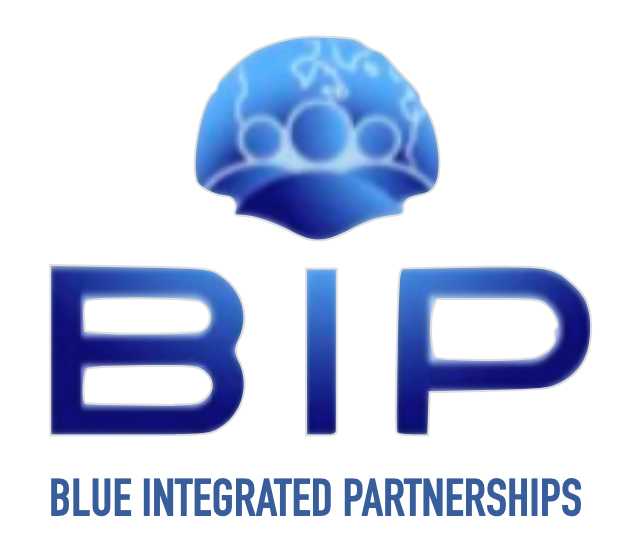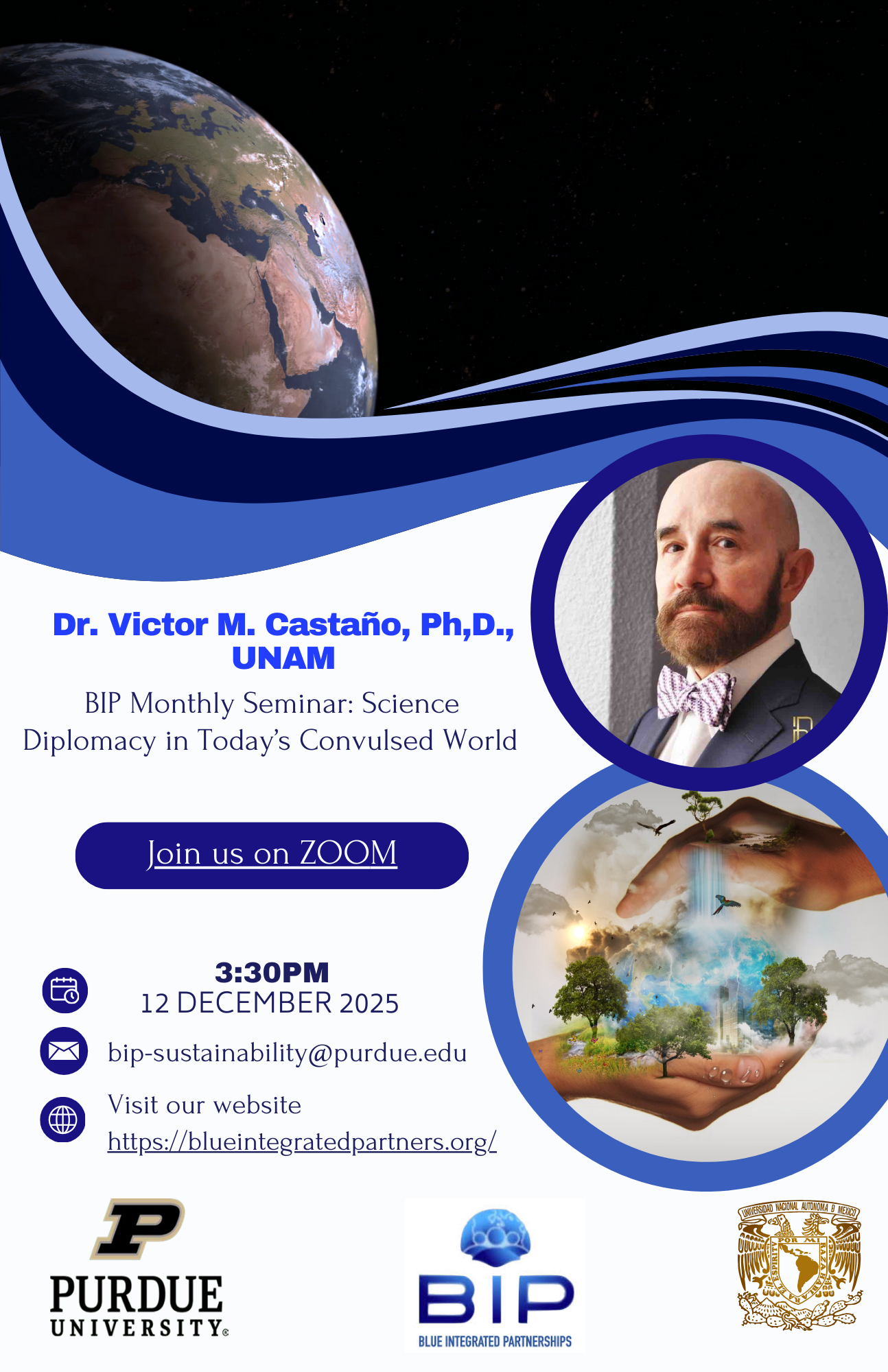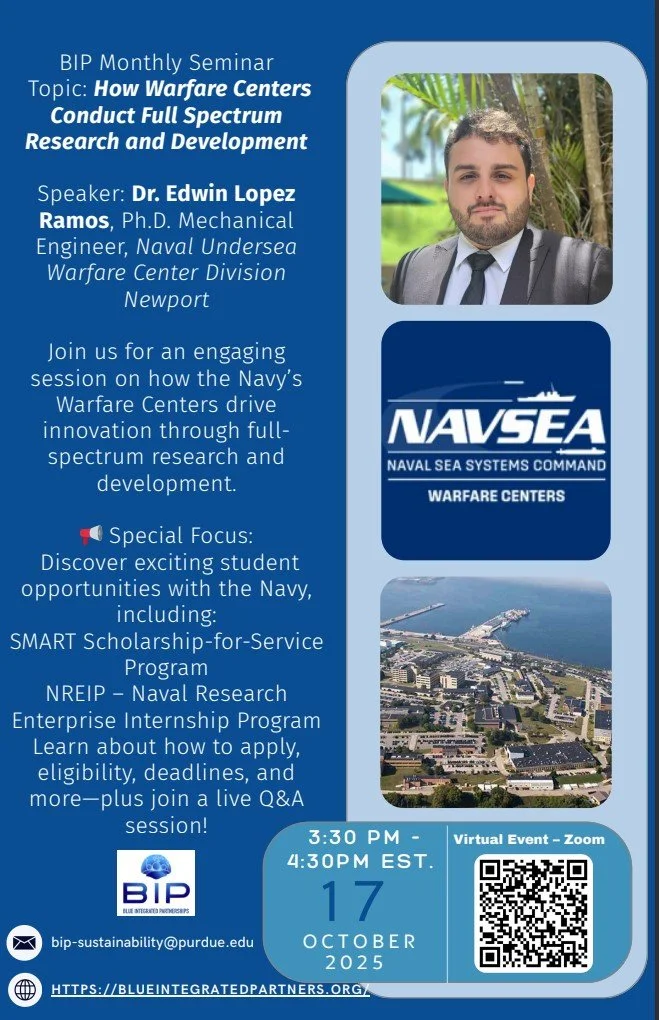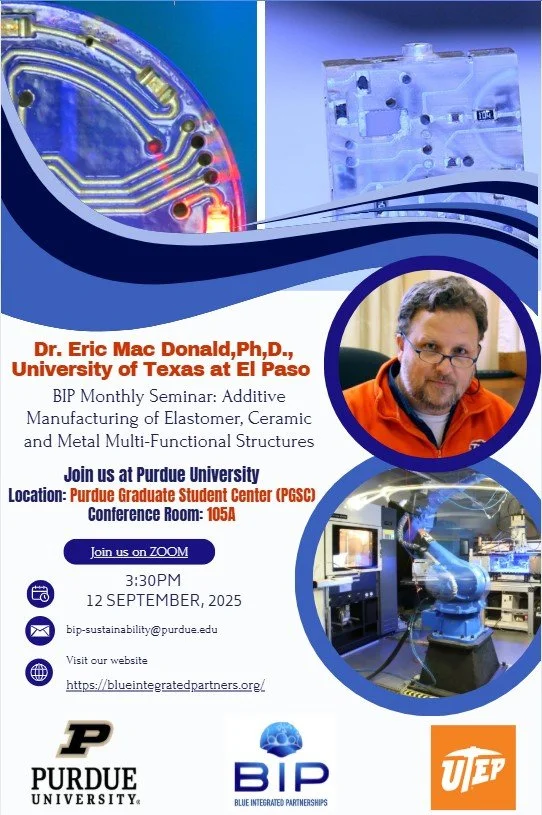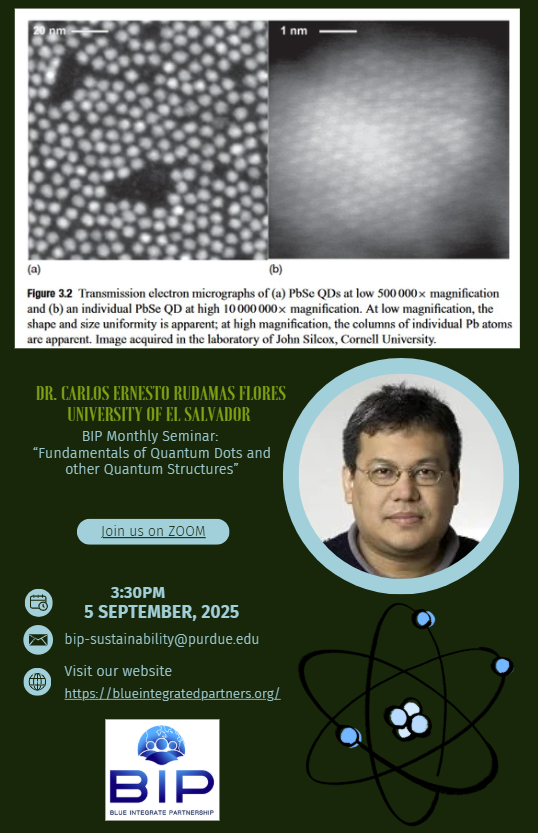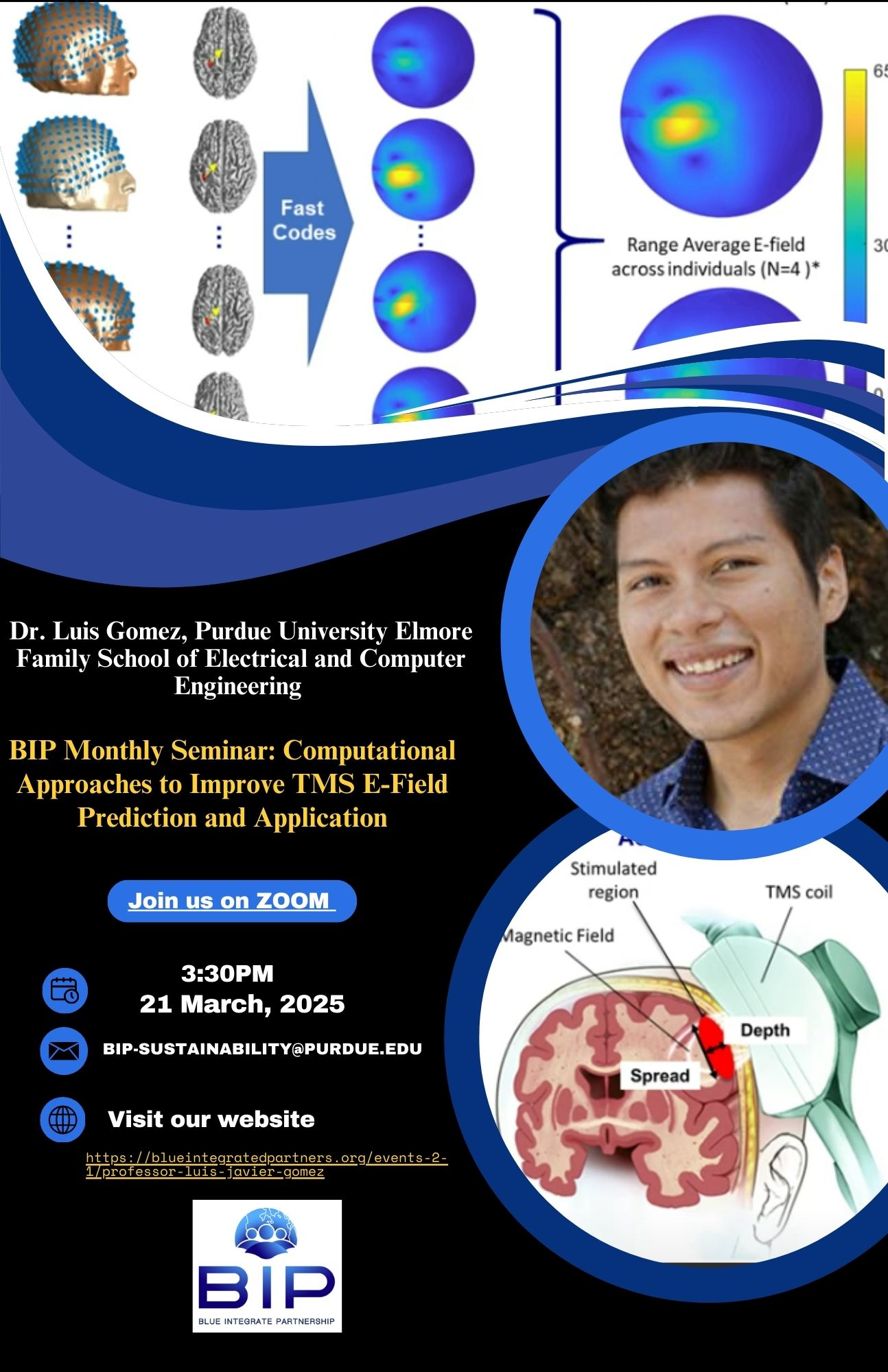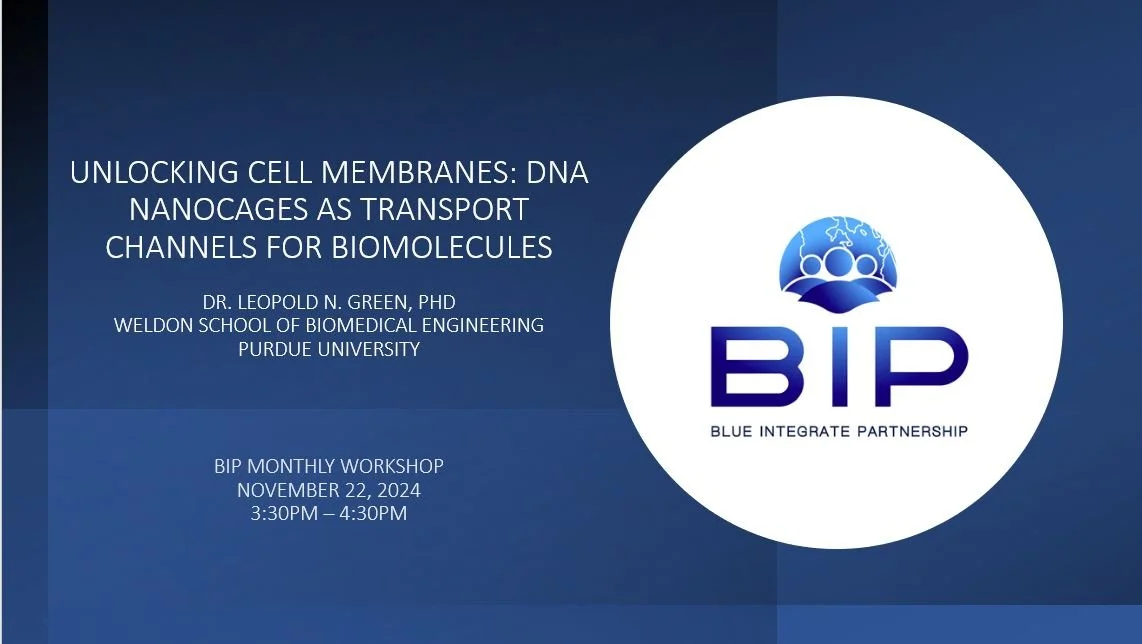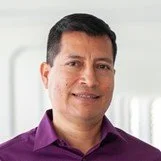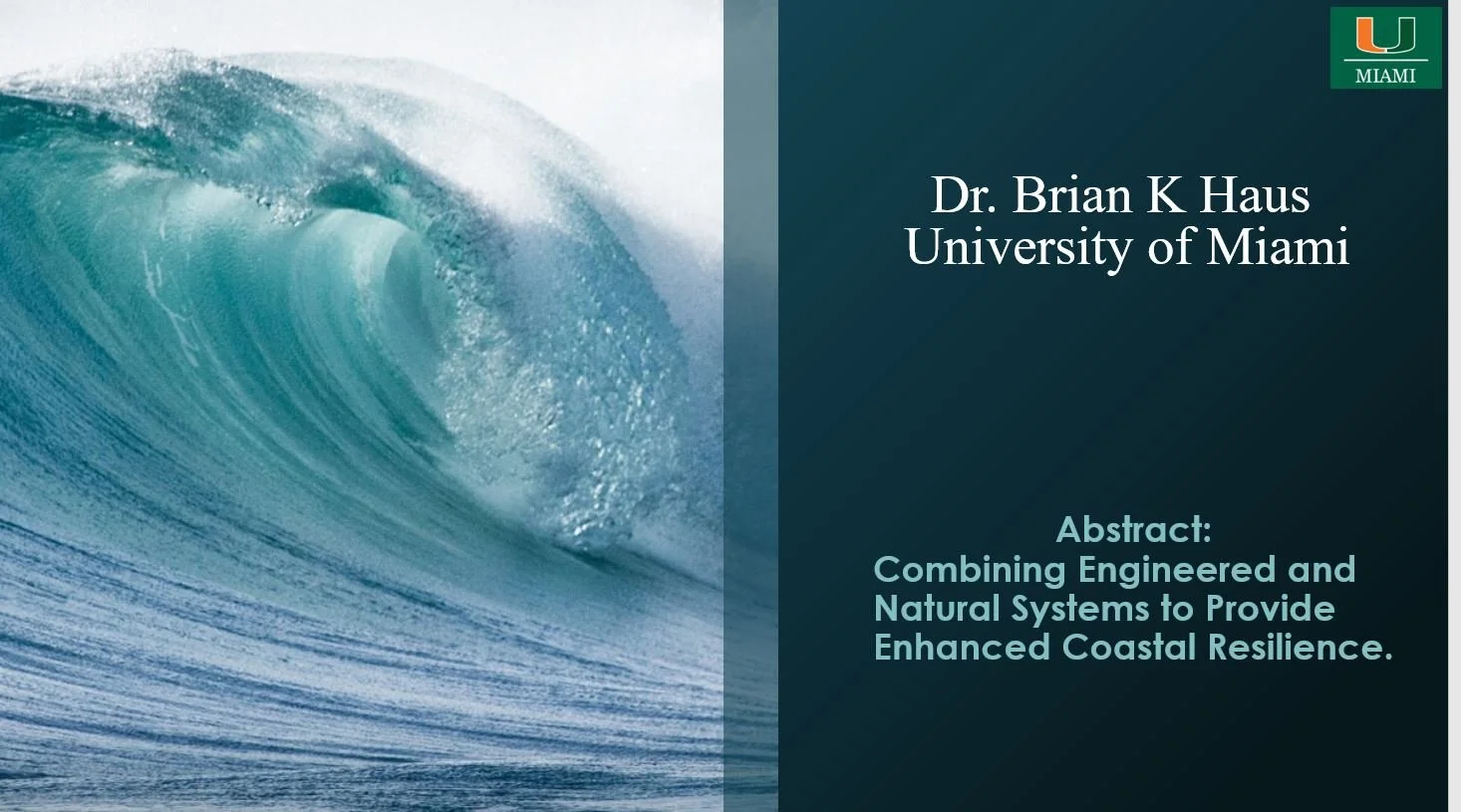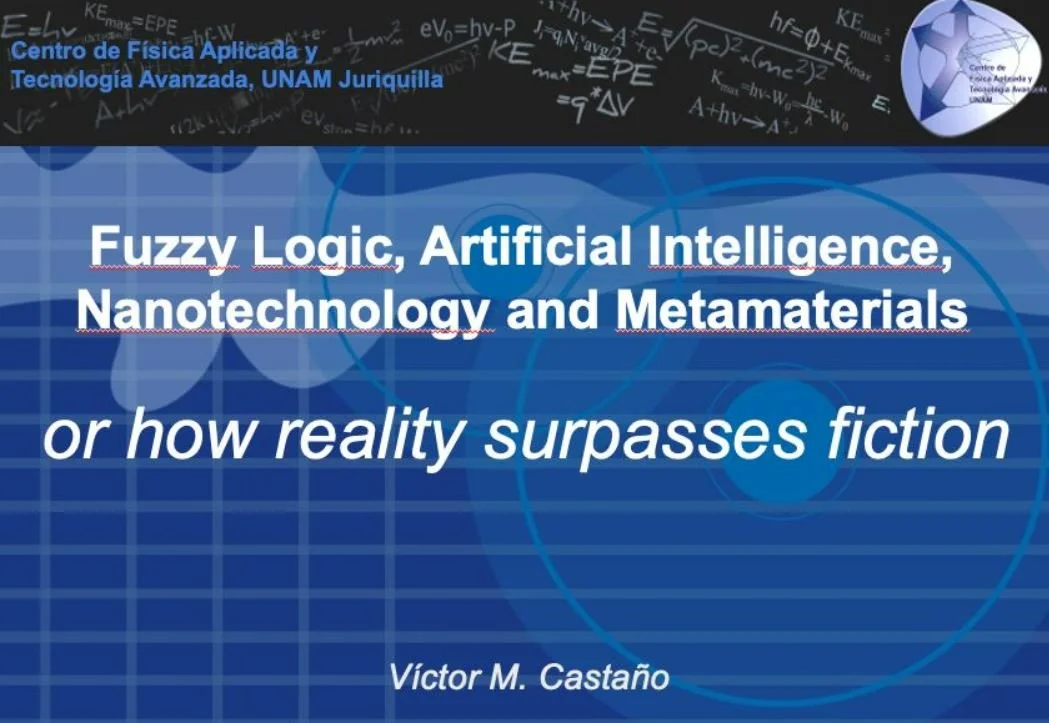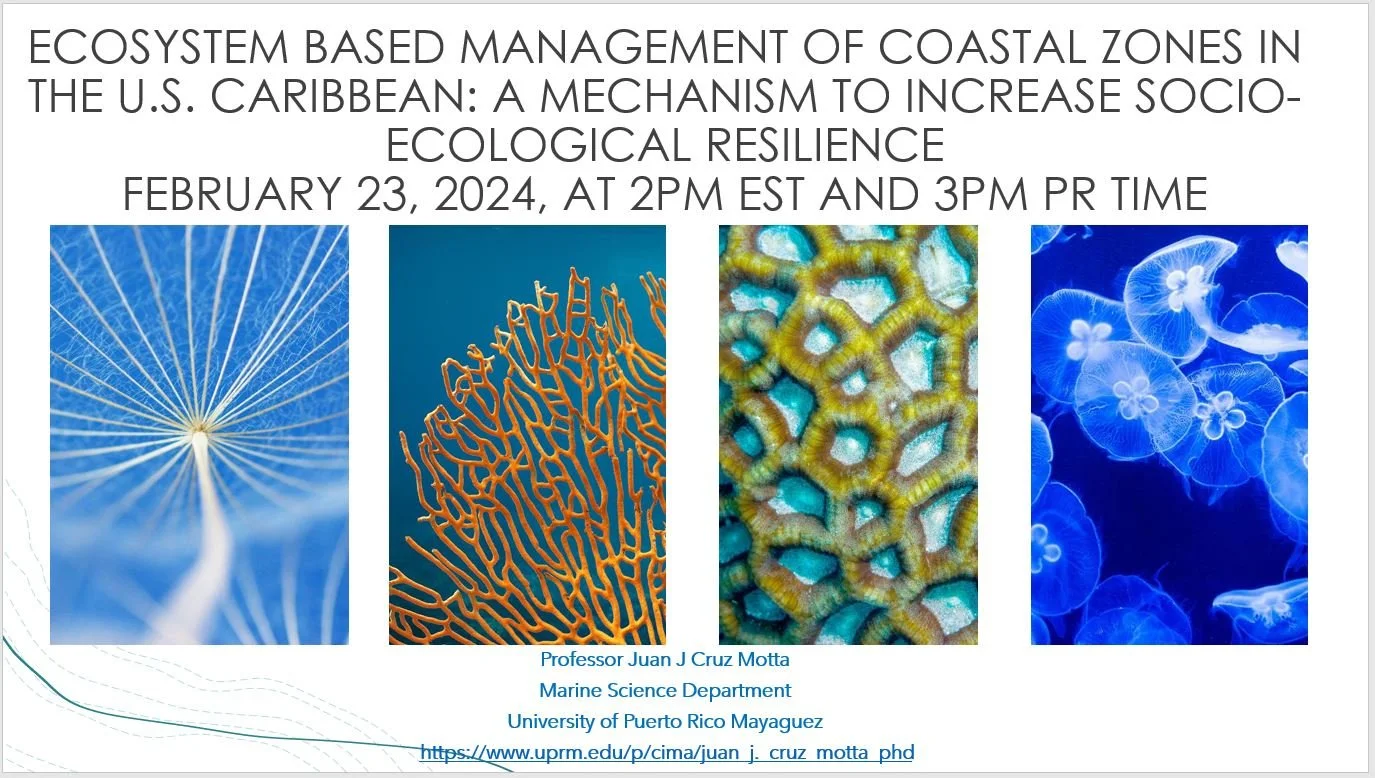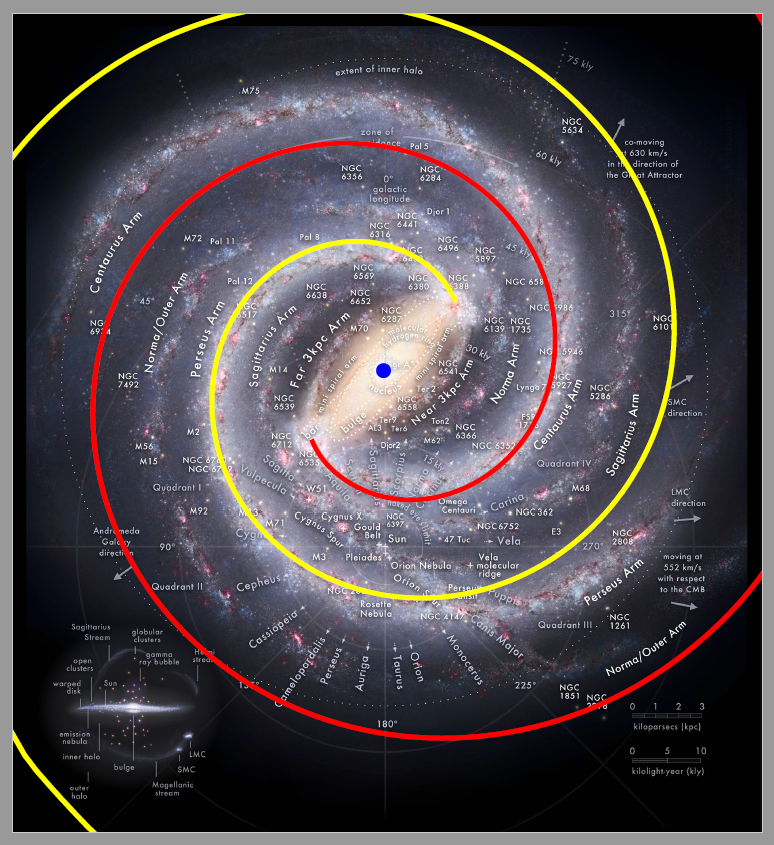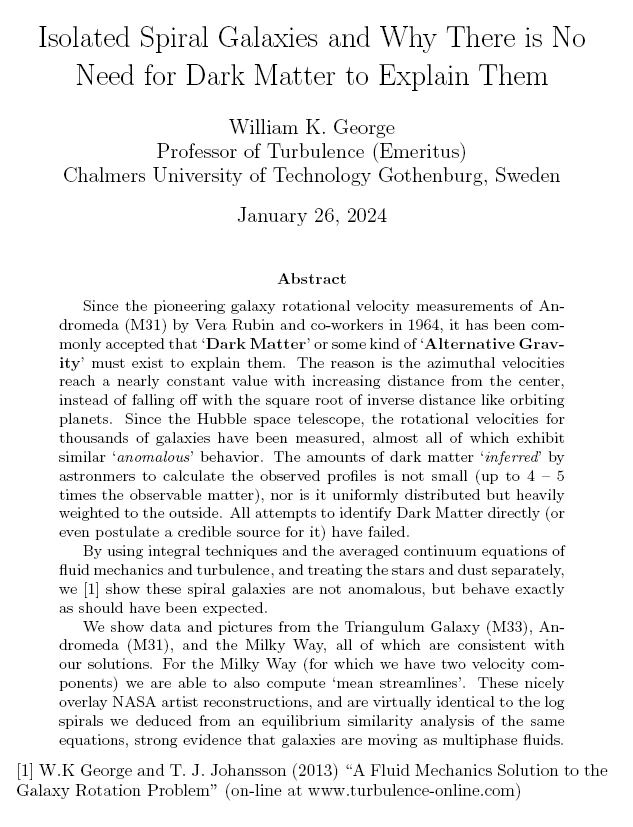
BIP Monthly Seminar Speakers
BIP Monthly Seminar Speakers
Dr. Victor M. Castaño, Ph,D.,
Science Diplomacy in Today’s Convulsed World
Victor M. Castaño
Abstract:
A brief review of how Science has been involved in Diplomacy since ancient times will be presented, along with some fundamental definitions around the concept of Science Diplomacy and how it is urgently required for the conflicts that Mankind faces nowadays. Some specific examples will be discussed. Finally, the concept of Engineering Diplomacy will be introduced.
Short Bio: Prof. Víctor M. Castaño is a recognized international leader in several areas of applied science and technology . He holds a B.Sc. degree in Engineering Physics and M.Sc. and Ph.D. in Physics from the Universidad Nacional Autonoma de Mexico. He spent 2 years at IBM´s Thomas J. Watson Research Center in New York as postdoctoral fellow. He has been a lecturer at the Universidad Nacional Autonoma de Mexico (Faculties of Chemistry, Sciences, Engineering, Accounting and Administration and Dentistry), Universidad Autonoma de Querétaro (Faculties of Engineering, Medicine, Accounting and Administration, Psychology and Law), the Autonomous University of Nuevo León (Faculty of Physical-Mathematical Sciences), the Universidad Iberoamericana, the Instituto Tecnológico de Querétaro, etc. He was the founding Director of the Center for Applied Physics and Advanced Technology of the UNAM in Juriquilla, Querétaro. Prof. Castaño has published around 850 articles in international refereed and indexed journals, 260 articles in conferences proceedings, 31 book chapters, 8 books and has 38 patents. He has 752 papers presented at conferences and 62 technical reports to various industries. He has been advisor to over 93 B.Sc., 33 M.Sc. and 73 Ph.D. thesis in Mexico, Peru, Argentina, Colombia, the USA, Canada, Spain and Germany. His work has received over 17,500 citations, especially in the last few years, when some of his pioneering contributions have begun to have great impact and have led him to receive international awards and recognitions and he is one of the most cited Latinamerican scientists in his area. In this respect, it is important to emphasize the fact that Víctor Castaño is an engineer and scientist of great originality, who dares not only to explore subjects that do not represent the fashion of international science, but also has the capacity of having his proposals receiving worldwide attention. He is Associate Editor of several prestigious international journals and Editor-in-Chief of Current nanoMedicine. He is Treasurer, by election, of the International Council for Materials Education and has been a member of several evaluation committees in Mexico, the United States, Canada, Spain, Costa Rica, Colombia, Brazil, etc. Probably the areas where Prof. Castaño is best known is in materials science and biomedicine, where he invented a very extensive list of new materials and technologies for various applications. He has also been strongly involved on the social implications of Science and Technology and he is currently associated to the M.Sc. Program of Applied Ethics and Bioethics of the Faculty of Law of the Universidad Autonoma de Queretaro and the Caribbean Research Ethics Education Initiative Master of Science Program, with the Universidad Autonoma de Queretaro (Mexico), St. George's University (Grenada), Clarkson University (USA) and The National Institute of Health (USA).
Join Zoom Meeting
https://purdue-edu.zoom.us/j/7992551685?pwd=eTVMQzc0RW04U2JyL1l5c0kzR1NnQT09
Meeting ID: 799 255 1685
Passcode: 4YX6kK
Join by SIP
7992551685@zoomcrc.com
Join by H.323
162.255.37.11 (US West)
162.255.36.11 (US East)
Meeting ID: 799 255 1685
Passcode: 490674
Dr. Edwin Lopez Ramos, PH.D.
Introduction to how Warfare centers conduct full spectrum research and development. Dr. López Ramos and team will provide an introduction to the Naval Undersea Warfare Center Division Newport’s (NUWC DIV NPT) bioinspired portfolio along with current SMART scholars. There will also be a Q&A for academic collaborations, student internships and graduate student funding opportunities.
Join Zoom Meeting
https://purdue-edu.zoom.us/j/7992551685?pwd=eTVMQzc0RW04U2JyL1l5c0kzR1NnQT09
Meeting ID: 799 255 1685
Passcode: 4YX6kK
Join by SIP
7992551685@zoomcrc.com
Join by H.323
162.255.37.11 (US West)
162.255.36.11 (US East)
Meeting ID: 799 255 1685
Passcode: 490674
Dr. Eric MacDonald, PH. D.
Additive Manufacturing of Elastomer, Ceramic and Metal
Multi-functional Structures
Eric MacDonald, Ph.D., P.E.,
Murchison Chair and Professor, Aerospace and Mechanical Engineering
Associate Dean of Research and Graduate Studies, College of Engineering
The University of Texas at El Paso
Joint Faculty Appointment, Oak Ridge National Laboratory
Abstract
3D printing has been historically relegated to fabricating conceptual models and prototypes; however, increasingly, research is now focusing on fabricating functional end-use products. As patents for 3D printing expire, new low-cost desktop systems are being adopted more widely and this trend is leading to a diversity of new products, processes and available materials. However, currently the technology is generally confined to fabricating single material static structures. For additively manufactured products to be economically meaningful, additional functionalities are required to be incorporated in terms of electronic, electromechanical, electromagnetic, thermodynamic, chemical and optical content. By interrupting the 3D printing and employing complementary manufacturing processes, additional functional content can be included in mass-customized structures. This presentation will review work in multi-process 3D printing for creating structures with consumer-anatomy-specific wearable electronics, electromechanical actuation, electromagnetics, energy storage, propulsion, embedded sensors in soft tooling – in polymers, elastomers, metal and ceramic material systems.
Eric MacDonald's Biography
Eric MacDonald, Ph.D. is a professor of aerospace and mechanical engineering and Murchison Chair at the University of Texas at El Paso and serves as the Associate Dean of Research and Graduate Studies for the College of Engineering. Dr. MacDonald received his doctoral degree (2002) in Electrical and Computer Engineering from the University of Texas at Austin. He worked in industry for 12 years at IBM and Motorola and subsequently co-founded a start-up specializing in CAD software and the startup was acquired by a firm in Silicon Valley. Dr. MacDonald held faculty fellowships at NASA’s Jet Propulsion Laboratory, US Navy Research and was awarded a US State Department Fulbright Fellowship in South America. His research interests include 3D printed multi-functional applications and process monitoring in additive manufacturing with instrumentation and computer vision for improved quality and yield. As a co-founding editor of the Elsevier journal Additive Manufacturing, MacDonald has helped direct the academic journal to have highest impact factor among all manufacturing journals worldwide. He has recently been involved in the commissioning of a second partner journal, Additive Manufacturing Letters, upon which he serves as the Editor-in-Chief. Recent projects include 3D printing of structures such as nano satellites with structurally-embedded electronics - one of which was launched into Low Earth Orbit in 2013 and a replica of which was on display at the London Museum of Science. He has over 100 peer-reviewed publications, dozens of patents, one of which was licensed by Sony and Toshiba from IBM. He is a member of ASME, ASEE, senior member of IEEE and a registered Professional Engineer in the USA state of Texas.
Join Zoom Meeting
https://purdue-edu.zoom.us/j/7992551685?pwd=eTVMQzc0RW04U2JyL1l5c0kzR1NnQT09
Meeting ID: 799 255 1685
Passcode: 4YX6kK
Join by SIP
7992551685@zoomcrc.com
Join by H.323
162.255.37.11 (US West)
162.255.36.11 (US East)
Meeting ID: 799 255 1685
Passcode: 490674
Dr. Carlos Ernesto Rudamas Flores
Abstract "We will discuss the fundamentals of quantum dots (QDs), taking a journey from three-dimensional (bulk) semiconductor materials to zero-dimensional ones (quantum dots), emphasizing the change in their optical and electronic properties. Finally, we will discuss some important applications of these nanomaterials and some environmentally friendly alternatives."
Join Zoom Meeting
https://purdue-edu.zoom.us/j/7992551685?pwd=eTVMQzc0RW04U2JyL1l5c0kzR1NnQT09
Meeting ID: 799 255 1685
Passcode: 4YX6kK
Join by SIP
7992551685@zoomcrc.com
Join by H.323
162.255.37.11 (US West)
162.255.36.11 (US East)
Meeting ID: 799 255 1685
Passcode: 490674
Dr. William Serrano
Join Zoom Meeting
https://purdue-edu.zoom.us/j/7992551685?pwd=eTVMQzc0RW04U2JyL1l5c0kzR1NnQT09
Meeting ID: 799 255 1685
Passcode: 4YX6kK
Join by SIP
7992551685@zoomcrc.com
Join by H.323
162.255.37.11 (US West)
162.255.36.11 (US East)
Meeting ID: 799 255 1685
Passcode: 490674
Dr. Luis Javier Gomez
Join Zoom Meeting
https://purdue-edu.zoom.us/j/7992551685?pwd=eTVMQzc0RW04U2JyL1l5c0kzR1NnQT09
Meeting ID: 799 255 1685
Passcode: 4YX6kK
Join by SIP
7992551685@zoomcrc.com
Join by H.323
162.255.37.11 (US West)
162.255.36.11 (US East)
Meeting ID: 799 255 1685
Passcode: 490674
Title: Computational Approaches to Improve TMS E-Field Prediction and Application
Abstract:
Transcranial magnetic stimulation (TMS) is a noninvasive technique used in neuroscience research and for the treatment of psychiatric and neurological disorders. During TMS, a current-carrying coil placed on the scalp induces an electric field (E-field) that modulates targeted neuronal circuits. Computational simulations of the induced E-field are increasingly used to gain a mechanistic understanding of TMS effects on the brain and to inform its administration. However, existing computational frameworks often neglect various inherent contingencies of the TMS setup, which can result in an E-field that differs from the one realized in practice.
To enhance the safe and effective use of computational simulations, we have developed a novel variation-aware computational E-field solver that predicts the expected value of the electric field while also providing confidence intervals to indicate potential variability in the actual E-field dose delivered. Our framework leverages fast computational methods, enabling its application in determining population-level optimal coil placements for targeting the dorsolateral prefrontal cortex (DLPFC) in depression treatments. For instance, our predicted optimal coil placement across individuals corroborates recent findings suggesting that the clinically prescribed coil placement is suboptimal. Additionally, our framework facilitates the computation of individualized optimal coil placements while accounting for limitations in the precision and accuracy of TMS coil positioning protocols and potential segmentation errors.
Finally, I will briefly describe other ongoing efforts in my lab, including the design and fabrication of focal TMS coils, modeling the multiphysics response of cells to incident electromagnetic fields, and developing novel conductivity measurement techniques.
Biography:
Luis Gomez is an Assistant Professor at Purdue University, West Lafayette, IN, USA, where he is developing computational electromagnetics methods to enhance brain stimulation technologies. He received his M.S. and Ph.D. degrees in electrical engineering from the University of Michigan, Ann Arbor, MI, USA, in 2014 and 2015, respectively. He subsequently pursued postdoctoral research in the Department of Psychiatry at Duke University, Durham, NC, USA, where he developed focal noninvasive transcranial magnetic brain stimulation coils. Dr. Gomez is the recipient of a K99/R00 Brain Initiative Award and was recognized with the Journal of Neural Engineering Outstanding Reviewer Award in 2019.
Dr. Mirian Velay Lizancos
https://web.ics.purdue.edu/~mvelayli/
https://engineering.purdue.edu/CCE/People/ptProfile?resource_id=185498
Join Zoom Meeting
https://purdue-edu.zoom.us/j/7992551685?pwd=eTVMQzc0RW04U2JyL1l5c0kzR1NnQT09
Meeting ID: 799 255 1685
Passcode: 4YX6kK
Join by SIP
7992551685@zoomcrc.com
Join by H.323
162.255.37.11 (US West)
162.255.36.11 (US East)
Meeting ID: 799 255 1685
Passcode: 490674
Dr. Leopold Green
Title: Unlocking Cell Membranes: DNA Nanocages as Transport Channels for Biomolecules
Nucleic acids are highly programmable materials ideal for creating nanoscale structures. Their biocompatibility and low production costs make them suitable for various biomedical applications.
This work presents a DNA nanocage engineered to facilitate the selective transport of biomolecules across prokaryotic and eukaryotic cell membranes. The design enables the transfer of biomolecules, from single ions to larger proteins, bypassing natural pathways. We showcase a library of DNA motifs effective for transport in various cell types, including ion translocation in live neurons and transfer of larger biomolecules like green fluorescent protein (GFP) across brain cancer and stem cell membranes.
The versatility of this nanocage design offers promising opportunities for targeted drug delivery, biosensing, and improved intercellular communication, ensuring stability and precision in interactions with lipid bilayers.
https://engineering.purdue.edu/BME/People/ptProfile?resource_id=256061
Join Zoom Meeting
https://purdue-edu.zoom.us/j/7992551685?pwd=eTVMQzc0RW04U2JyL1l5c0kzR1NnQT09
Meeting ID: 799 255 1685
Passcode: 4YX6kKJoin by SIP
7992551685@zoomcrc.comJoin by H.323
162.255.37.11 (US West)
162.255.36.11 (US East)
Meeting ID: 799 255 1685
Passcode: 490674
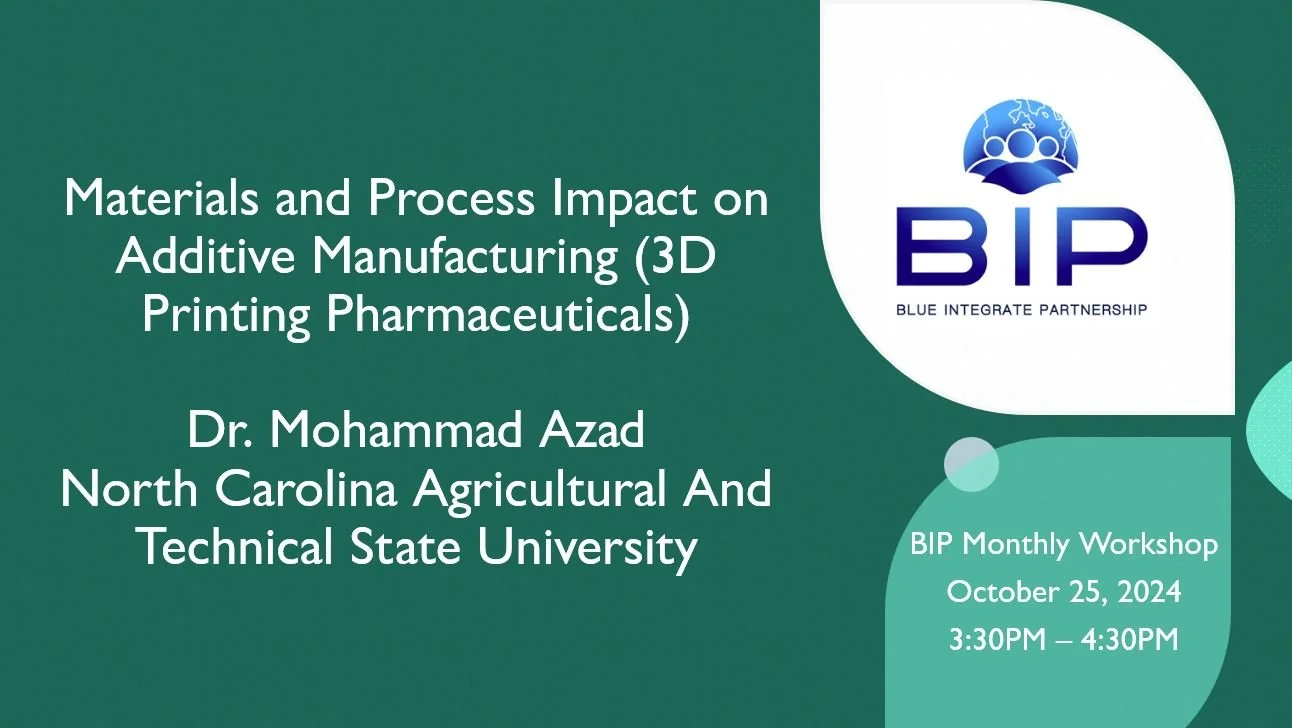
Dr. Mohammad Azad
Materials and Process Impact on Additive Manufacturing (3D Printing) of Pharmaceuticals
Abstract: Three-dimensional (3D) printing, a transformative technology known as additive manufacturing, is increasingly gaining traction in the pharmaceutical industry as an advanced manufacturing process. It enables personalized medicine through adjustable drug loading, complex dosage form design, on-demand production, and the creation of pills with multiple active pharmaceutical ingredients (APIs)., etc. where the current manufacturing processes follow one-size-fits-all approach unable to do that due to scientific and technological limitations. Among several types of printing systems, extrusion-based 3D printing is considered simple, low cost, scalable, and handles a wide range of materials. Pressure-assisted microsyringe (PAM), a micro extrusion-based 3D printing, is well suited for the pharmaceutical industry because it can handle materials at low temperatures. The PAM printing process involves the usage of the polymer as the primary functional excipient to prepare the ink and subsequently print the dosage structure or matrix (i.e., tablet, capsule, film, etc.). The challenge for PAM printing- is that to obtain a perfect 3D printed matrix, significant trial and error effort is required due to the materials and process impact on printing. In this research talk, research projects will be discussed, and how the challenges were attempted to minimize.
Bio: Dr. Mohammad Azad is an associate professor in the Chemical, Biological, and Bioengineering (CBBE) Department at North Carolina Agricultural and Technical State University (NCAT). He received his Ph.D. in Chemical Engineering from the New Jersey Institute of Technology (NJIT) and postdoctoral research at the Massachusetts Institute of Technology (MIT). He contributed to cutting-edge projects such as DARPA's "Pharmacy on Demand" program at MIT and NSF ERC center (Center for Structured Organic Particulate Systems, C-SOPS) at NJIT. Dr. Azad joined the CBBE department in the Fall of 2018, and his current research spans 3D printing, polymer processing, materials characterization, nanoparticles, and data analytics. His research is funded by DOD, NSF-SCH, and NSF Engines. Dr. Azad has authored 6 patents, 3 book chapters, and 26 journals and serves on the editorial board of the Advanced Powder Technology Journal. He has mentored 9 graduate and 19 undergraduate students.
Join Zoom Meeting
https://purdue-edu.zoom.us/j/7992551685?pwd=eTVMQzc0RW04U2JyL1l5c0kzR1NnQT09
Meeting ID: 799 255 1685
Passcode: 4YX6kK
Join by SIP
7992551685@zoomcrc.com
Join by H.323
162.255.37.11 (US West)
162.255.36.11 (US East)
Meeting ID: 799 255 1685
Passcode: 490674
Dr. Gerardo Carbajal
Analysis and Applications of Heat Pipes for Heating and Cooling Systems
Department of Mechanical Engineering
Florida Polytechnic University
Gerardo Carbajal, Ph.D.
Abstract
Since the first basic heat pipe concept proposed by Gaugler in 1944, the heat pipe concept has been applied to a variety of simple and complex designs for space and terrestrial applications. Originally heat pipes were designed to heat transfer applications in space vehicles, but later due to its high thermal performance and high thermal conductivity effect reduced weight it was applied to terrestrial applications projects. Heat pipes applications as heat transfer devices and thermal spreaders have also found a lot of applications in electronic cooling heat pipes are being considered to be one of the most efficient passive cooling devices for electronic cooling. This seminar will provide an overview of physics, mathematical modeling, and applications of heat pipes.
Gerardo Carbajal is an associate professor in the ME Department at Florida Polytechnic University. After spending 11 years at the AGMUS Gurabo-Campus in Puerto Rico he joined the ME Department at FPU in 2019. He completed his PhD in Mechanical Engineering from the Rensselaer Polytechnic Institute Troy, NY in 2006. His research is focused on heat pipes, heat and water management analysis in PEM fuel cells, and two-phase flow for heat transfer enhancement applications to large- or small-scale applications such as in mini and micro-channels for electronic cooling. Some of his awards include Fellow of the Department of Energy- National Energy Technology Laboratory, Morgantown-WV, the Cash Family Award for Best Mentor at the National Wind Renewable Center, TX; the Blue Integrated Partnership (BIP)-Frederic Douglas Award, For Exceptional Leadership, August. 2023, and he was nominated to the ABLAZE Research Award 2024- Florida Polytechnic University, March 2024.
https://floridapoly.edu/directory/faculty/gerardo-carbajal.php
Join us on May 31, 2024 at 2 PM EST for Professor Gerardo Carbajal’s Workshop
Zoom Link:
Join Zoom Meeting
https://purdue-edu.zoom.us/j/7992551685?pwd=eTVMQzc0RW04U2JyL1l5c0kzR1NnQT09
Meeting ID: 799 255 1685
Passcode: 4YX6kK
Dr. Brian Haus
https://people.miami.edu/profile/db4da3403c32278b9271f0dd08b12080
Abstract:
Combining engineered and natural systems to provide enhanced coastal resilience.
Dr. Brian K. Haus
University of Miami
The use of engineered systems such as submerged breakwaters and or seawalls for coastal protection was common practice until the late 1900’s when the negative impacts on adjacent properties and ecosystems became widely recognized. This led to a strong preference for protection or restoration of natural coastal dunes and reefs to provide local protection. However for developed shorelines and under rising sea-level regimes it may not be possible to use natural approaches alone. This has led to the development of hybrid engineered and natural systems that can provide enhanced coastal resilience as well as other ecosystem services. At the University of Miami we have developed a modular hybrid approach that can be used for both seawalls and submerged breakwaters (SEAHIVE). This system provides several distinct advantages over traditional designs. In particular the high porosity provides enhanced energy dissipation and reduced wave reflections. The interconnected structures also provide the ability to incorporate natural components such as seagrasses, mangroves or corals. A key aspect of our ongoing research to quantify the protective benefits of the SEAHIVES compared to traditional solutions and to quantify the enhanced coastal resilience provided by the natural components. This is accomplished through comprehensive testing in the Surge-Structure-Atmosphere Interaction (SUSTAIN) hydrodynamic research facility. Our results show that such hybrid systems can provide significant added wave dissipation in some conditions.
Join us on April 26, 2024 at 2 PM EST for Professor Brian K Haus Workshop
Zoom Link:
Join Zoom Meeting
https://purdue-edu.zoom.us/j/7992551685?pwd=eTVMQzc0RW04U2JyL1l5c0kzR1NnQT09
Meeting ID: 799 255 1685
Passcode: 4YX6kK
Press Release:
Dr. Victor M. Castaño
Abstract: Metamaterials and their applications will be defined and discussed. The role that artificial intelligence, fuzzy logic and nanotechnology in the development of novel metamaterials will be analyzed, along with the basic principles and their potential uses.
Join us on March 29, 2024 at 2 PM EST for Professor Victor M. Castaño’s Workshop
Passcode: Wc1rc.MY

Dr. William K George
Join Zoom Meeting
https://purdue-edu.zoom.us/j/7992551685?pwd=eTVMQzc0RW04U2JyL1l5c0kzR1NnQT09
Meeting ID: 799 255 1685
Passcode: 4YX6kK
Join by SIP
7992551685@zoomcrc.com
Join by H.323
162.255.37.11 (US West)
162.255.36.11 (US East)
Meeting ID: 799 255 1685
Passcode: 490674

